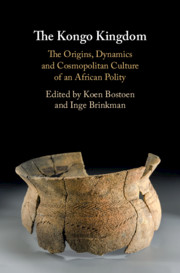
-
Select format
-
- Publisher:
- Cambridge University Press
- Publication date:
- 12 November 2018
- 15 November 2018
- ISBN:
- 9781108564823
- 9781108474184
- 9781108463928
- Dimensions:
- (228 x 152 mm)
- Weight & Pages:
- 0.67kg, 334 Pages
- Dimensions:
- (229 x 152 mm)
- Weight & Pages:
- 0.75kg, 344 Pages
- Subjects:
- Non-Western Art, Area Studies, African Studies, Art, History, African History
You may already have access via personal or institutional login- Subjects:
- Non-Western Art, Area Studies, African Studies, Art, History, African History
Book description
The Kongo kingdom, which arose in the Atlantic Coast region of West-Central Africa, is a famous emblem of Africa's past yet little is still known of its origins and early history. This book sheds new light on that all important period and goes on to explain the significance of its cosmopolitan culture in the wider world. Bringing together different new strands of historical evidence as well as scholars from disciplines as diverse as anthropology, archaeology, art history, history and linguistics, it is the first book to approach the history of this famous Central African kingdom from a cross-disciplinary perspective. All chapters are written by distinguished and/or upcoming experts of Kongo history with a focus on political space, taking us through processes of centralisation and decentralisation, the historical politics of extraversion and internal dynamics, and the geographical distribution of aspects of material and immaterial Kongo culture.
Reviews
'An interdisciplinary look at the history and culture of the Kingdom of Kongo, which flourished around the lower reaches of the Congo River, from c. 1250 through c. 1600, for a time having ties to the Vatican as well other western powers. … A very good work, this is primarily for the specialist in African history.'
Source: The NYMAS Review
Contents
Metrics
Altmetric attention score
Full text views
Full text views help Loading metrics...
Loading metrics...
* Views captured on Cambridge Core between #date#. This data will be updated every 24 hours.
Usage data cannot currently be displayed.
Accessibility standard: Unknown
Why this information is here
This section outlines the accessibility features of this content - including support for screen readers, full keyboard navigation and high-contrast display options. This may not be relevant for you.
Accessibility Information
Accessibility compliance for the PDF of this book is currently unknown and may be updated in the future.


